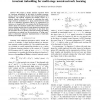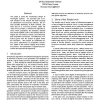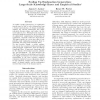4650 search results - page 144 / 930 » Generating and evaluating evaluative arguments |
ERCIMDL
2010
Springer
13 years 7 months ago
2010
Springer
Abstract. Today, digital libraries more and more have to rely on semantic techniques during the workflows of metadata generation, search and navigational access. But, due to the st...
IJCNN
2006
IEEE
14 years 3 months ago
2006
IEEE
— We present a simple, intuitive argument based on “invariant imbedding” in the spirit of dynamic programming to derive a stagewise second-order backpropagation (BP) algorith...
CLIN
2003
13 years 10 months ago
2003
This paper describes an experiment on extracting Hungarian multi-word lexemes from a corpus, using statistical methods. Corpus preparation—the addition of POS tags and stems—w...
IJCAI
2003
13 years 10 months ago
2003
This paper is about the evolutionary design of multi-agent systems. An important part of recent research in this domain has been focusing on collaborative revolutionary methods. W...
AAAI
1996
13 years 10 months ago
1996
To explain complex phenomena, an explanation system must be able to select information from a formal representation of domain knowledge, organize the selected information into mul...



